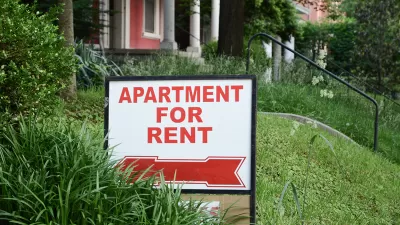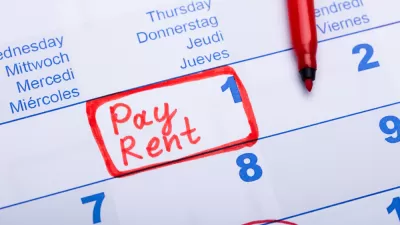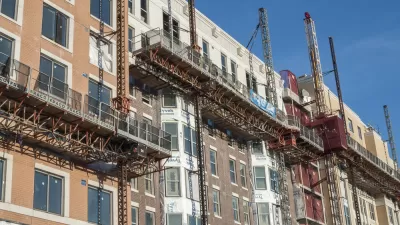A new survey highlights the impact of the COVID-19 crisis on small landlords, who provide much of the nation's low-cost rental housing.

In a recent paper, Elijah de la Campa and Vincent J. Reina assess the impact of the pandemic on private landlords, "who supply the majority of the nation’s lowest-cost rentals." De la Campa and Reina used survey data from 10 U.S. cities "to better understand the impact of the pandemic on landlords’ rental incomes and business practices."
Survey responses show that "the share of landlords who collected 90 percent or more of their potential rental revenue fell 27 percentage points from 2019 to 2020," and "smaller and mid-sized landlords, who had higher exposure to non-payment prior to the pandemic, were more likely to have seen rental revenues drop by more than 50 percent." The authors note that "10 percent of owners with five or fewer units—those most likely to provide affordable units—reported receiving at most half of their rental revenue during the pandemic." The study also found that " renters of color have disproportionately borne the negative impact of landlords’ decisions during the COVID-19 pandemic" with landlords taking more punitive actions against tenants in communities of color.
The results "paint a troubling picture," as the "loss of revenue for our nation’s primary providers of lower-cost housing has real implications for the current and future housing stock." With landlords deferring maintenance, we could also see reduced housing quality and lower lifespans for older buildings.
The authors conclude that "[t]hese dynamics suggest an opportunity for policymakers to help support landlords while also preserving the privately-owned affordable rental stock" through programs that connect funding to affordability requirements, facilitate sale of properties to tenants or socially responsible parties, and address punitive measures such as eviction. "Affirmative federal and local commitments to further fair housing, as well as to communities of color well beyond the pandemic, are essential to address long-standing racial disparities in access to good quality, affordable housing."
FULL STORY: HOW HAS THE PANDEMIC AFFECTED LANDLORDS?

Planetizen Federal Action Tracker
A weekly monitor of how Trump’s orders and actions are impacting planners and planning in America.

Congressman Proposes Bill to Rename DC Metro “Trump Train”
The Make Autorail Great Again Act would withhold federal funding to the system until the Washington Metropolitan Area Transit Authority (WMATA), rebrands as the Washington Metropolitan Authority for Greater Access (WMAGA).

The Simple Legislative Tool Transforming Vacant Downtowns
In California, Michigan and Georgia, an easy win is bringing dollars — and delight — back to city centers.

The States Losing Rural Delivery Rooms at an Alarming Pace
In some states, as few as 9% of rural hospitals still deliver babies. As a result, rising pre-term births, no adequate pre-term care and "harrowing" close calls are a growing reality.

The Small South Asian Republic Going all in on EVs
Thanks to one simple policy change less than five years ago, 65% of new cars in this Himalayan country are now electric.

DC Backpedals on Bike Lane Protection, Swaps Barriers for Paint
Citing aesthetic concerns, the city is removing the concrete barriers and flexposts that once separated Arizona Avenue cyclists from motor vehicles.
Urban Design for Planners 1: Software Tools
This six-course series explores essential urban design concepts using open source software and equips planners with the tools they need to participate fully in the urban design process.
Planning for Universal Design
Learn the tools for implementing Universal Design in planning regulations.
Smith Gee Studio
City of Charlotte
City of Camden Redevelopment Agency
City of Astoria
Transportation Research & Education Center (TREC) at Portland State University
US High Speed Rail Association
City of Camden Redevelopment Agency
Municipality of Princeton (NJ)





























